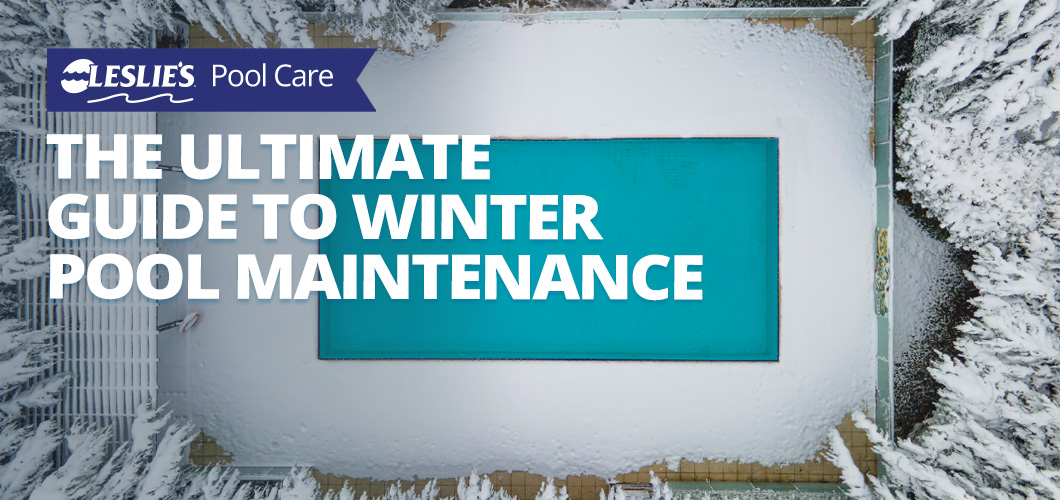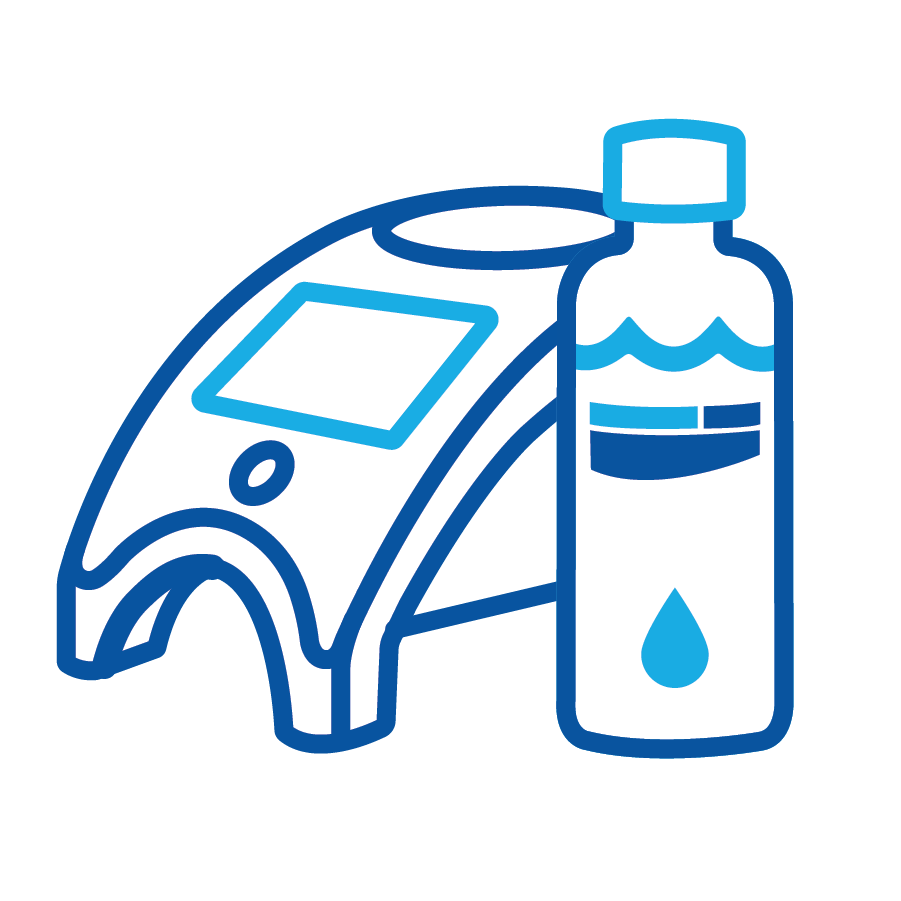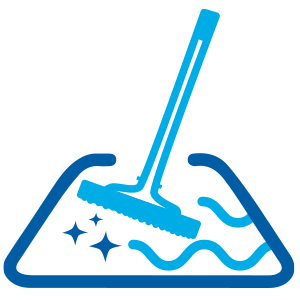
The Ultimate Guide to Winter Pool Maintenance
When cooler weather sets in, most pool owners assume their weekly pool care responsibilities can take a hiatus until spring. However, neglecting your pool during the colder winter months can compromise the water's health and ultimately lead to costly damages. This is true no matter what you do with your pool in the winter. Whether you fully winterized the pool, left it open, or took a hybrid approach in between, being diligent with your winter pool care can make or break the summer swim season ahead. In this article, we'll explore some of the best pool maintenance tips for winter to ensure your pool stays in peak condition, ready to enjoy when warmer days return.
Test Your Pool Water Throughout the Winter

Even when you’re not actively using the pool, routine water testing remains crucial. That said, you may not need to test the water as frequently as you do during the peak of summer. In summer, you should be testing the water at least once a week, if not 2–3 times or more. But when winter temperatures set in, use the thermometer as a guideline to determine your water testing cadence.
- 70ºF or Above: Test the water at least once a week.
- 65ºF or Below: Test at least once or twice a month.
- Freezing: Don’t break the ice to get a water sample! Just wait until it thaws.
Keep in mind that if you’re using a pool heater to keep the water warm, you should test the water weekly, just like you would in warmer weather.
While the frequency of testing may decrease with lower temperatures, it's absolutely crucial to continue monitoring the water's chemistry balance through the off-season. There are many factors that can impact the pH, Total Alkalinity, Free Chlorine levels, and more, even when it’s cold outside. Not only can this cause costly, corrosive damage to your pool structure and equipment — it can also cause unhealthy water conditions. Long story short, this causes you to miss out on valuable swim time and can lead to expensive repairs when the weather finally warms up again.
Do more than just glance at the pool to make sure the water is clear. Invest in a reliable at-home water test and follow a regular testing schedule to keep your pool water in optimal condition. You can also bring a water sample to your local Leslie’s, and we’ll test it for FREE! Our 10-point AccuBlue® water test delivers results in just 60 seconds, and includes a complimentary customized water treatment plan.
A Note on Balancing Your Pool in Winter:
If your pool is fully winterized, you won’t want to worry about balancing the water like you would with an open or partially closed pool. You'll need the help of your pool pump to balance the pool. But for all scenarios, maintaining proper sanitizer levels through the winter is a must. Keep your Free Chlorine level between 1–4 ppm at all times — it’s the best way to avoid a green pool when warmer weather arrives.
Keep Your Pool Clean

A clean pool is a healthy pool, even in the winter. Leaves, debris, and other contaminants can quickly accumulate, consuming chlorine and leaving your pool vulnerable to algae and bacteria. So, break out those cleaning accessories!
Skim an uncovered pool pool daily, and use a vacuum or automatic pool cleaner to remove any remaining debris that settles to the pool floor. To help minimize cleanup efforts, just cover the pool whenever it’s not in use. A quality winter pool cover, safety cover, or automatic pool cover acts as a barrier to keep debris out of the water. Or, if you’re trying to warm the pool up, a solar cover can also help streamline your cleaning duties. Remove leaves or debris from the top of the cover as needed, and use a cover pump to remove excess water from solid winter or safety covers.
Keeping the pool — or the pool cover — clean will save you loads of time and prevent extra hassle when you’re ready to start using the pool again.
Ensure Adequate Circulation and Adjust the Pump’s Run Time
Proper circulation is key to maintaining water quality, especially for pools that remain open or are only partially closed during the winter for reduced maintenance. Circulating the water helps distribute sanitizer evenly throughout the pool, preventing stagnant water that harbors algae and bacteria. However, because algae growth slows in cooler temperatures, you won’t have to run your pump for as long during the day.
Adjust your pool pump's run time schedule to align with the local weather forecast. Running the pump longer during warmer periods and reducing run time during colder spells can optimize energy usage while ensuring effective water circulation and filtration. In general, the rule of thumb for single speed pumps is to run the pump 1 hour a day for every 10ºF of air temperature. So, for example, if the daily high temperature is around 50ºF, you would only need to run the pump for about 5 hours each day. With variable speed pumps, the timing depends on a few other factors, like flow-dependent equipment and how you balance the timing between high and low speeds.
Just remember that if the temperatures drop too low and approach freezing, you MUST run the pump 24/7 on high speed to avoid freeze damage. In case of severe winter weather, be prepared with a backup plan, and understand how to perform an emergency winterization should the power go out.
Check the Water Levels to Avoid Equipment and Structural Damage

Undetected pool leaks can wreak havoc on your pool's infrastructure and equipment. This is especially true if the pool is covered and you’re not looking at it every day. During the winter, it's crucial to monitor water levels regularly as part of your pool maintenance regimen. Excessive water loss can indicate a leak that, if left unaddressed, can quickly lead to costly repairs.
For example, if the water level drops below the skimmer, and the pump turns on, your pump and other equipment risk severe damage. Or, in extreme cases with significant leakage, your pool structure may shift and crack, or the low water levels can cause the cover to fail and fall into the pool.
Check for any signs of leakage, look around the pool's perimeter for wet spots, and keep an eye on water levels to identify and address potential issues promptly. Maintaining proper water levels is not only essential for the pool's structural integrity, but also for the longevity of the pump and other equipment.
In Summary: Don’t Neglect Winter Pool Care
Winterizing your pool involves more than just covering it and forgetting about it until spring. By following these top pool maintenance tips, you can safeguard your pool against potential damage, keep the water healthy, and ensure a smooth transition to swimming season when warmer weather arrives. Regular testing, cleaning, circulation, and water level checks will contribute to the longevity of your pool and the enjoyment it provides for years to come.
If you ever have questions about maintaining your pool through the off-season months, you can always count on the experts at Leslie’s to help. You’ll find lots of great articles in our online Resource Center, such as this one that offers additional tips on maintaining a fully winterized pool. We also post weekly pool care videos on our YouTube channel to help you get the most out of your pool year-round. And finally, our friendly in-store pool experts are always available to answer questions about your specific pool. Stop by your local Leslie’s today, and remember to bring a water sample for a FREE in-store AccuBlue water test.